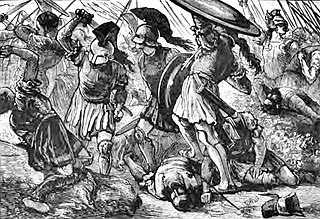
Year 323 BC was a year of the pre-Julian Roman calendar. At the time, it was known as the Year of the Consulship of Longus and Cerretanus. The denomination 323 BC for this year has been used since the early medieval period, when the Anno Domini calendar era became the prevalent method in Europe for naming years.

Macedonia, also called Macedon, was an ancient kingdom on the periphery of Archaic and Classical Greece, and later the dominant state of Hellenistic Greece. The kingdom was founded and initially ruled by the royal Argead dynasty, which was followed by the Antipatrid and Antigonid dynasties. Home to the ancient Macedonians, the earliest kingdom was centered on the northeastern part of the Greek peninsula, and bordered by Epirus to the west, Paeonia to the north, Thrace to the east and Thessaly to the south.

This article concerns the period 329 BC – 320 BC.
The denomination 322 BC for this year has been used since the early medieval period, when the Anno Domini calendar era became the prevalent method in Europe for naming years.

Antipater was a Macedonian general and statesman under the subsequent kingships of Philip II of Macedon and his son, Alexander the Great. In the wake of the collapse of the Argead house, his son Cassander would eventually come to rule Macedonia as a king in his own right.

Phocion was an Athenian statesman and strategos, and the subject of one of Plutarch's Parallel Lives.

The Diadochi were the rival generals, families, and friends of Alexander the Great who fought for control over his empire after his death in 323 BC. The Wars of the Diadochi mark the beginning of the Hellenistic period from the Mediterranean Sea to the Indus River Valley.

The Wars of the Diadochi, or Wars of Alexander's Successors, were a series of conflicts that were fought between the generals of Alexander the Great, known as the Diadochi, over who would rule his empire following his death. The fighting occurred between 322 and 281 BC.
Polyperchon, was a Macedonian Greek general who served both Philip II and Alexander the Great and then played an active role in the ensuing battles for control between Alexander's generals.

The Battle of Chaeronea was fought in 338 BC, near the city of Chaeronea in Boeotia, between Macedonia under Philip II and an alliance of city-states led by Athens and Thebes. The battle was the culmination of Philip's final campaigns in 339–338 BC and resulted in a decisive victory for the Macedonians and their allies.

The Lamian War, or the Hellenic War was fought by a coalition of cities including Athens and the Aetolian League against Macedon and its ally Boeotia. The war broke out after the death of the King of Macedon, Alexander the Great, and was part of a series of attempts to challenge Macedonian hegemony over mainland Greece.
Leonnatus was a Macedonian officer of Alexander the Great and one of the diadochi.
Leosthenes was an Athenian who was commander of the combined Greek army in the Lamian War. Leosthenes was the son of his namesake father Leosthenes who had suffered exile in 362/1 BC and who had fled to the court of Philip II. It is unknown by what means he had obtained the high reputation he had when he first makes his appearance in history. It has been inferred from a passage in Strabo, that he had first served under Alexander the Great in Asia; but it now seems certain that this is a mistake, and rather the reference should have been to Leonnatus.
Menon was a citizen of Pharsalus in Thessaly, and a man of great influence and reputation, took a prominent part in the Lamian war, and commanded the Thessalian cavalry in the battle with the Macedonians, in which Leonnatus was slain.
The Battle of Amorgos was one of the naval battles of the Lamian War, fought between the Macedonian navy under Cleitus the White and the Athenian navy under Euetion. Although few details are known, it was a clear Athenian defeat, although the Athenians seem to have suffered few losses. Regarded as the decisive naval battle of the war, it signalled the end of Athenian thalassocracy and political independence.
The Defeat of Leonnatus by Antiphilus occurred during the Lamian War fought between the Greek allies who had rebelled against the Macedonian Empire, and Leonnatus, the Macedonian satrap of Phrygia, who had come to aid the regent Antipater, who was being besieged by the Greeks in Lamia. The Greeks defeated the Macedonians.
The Battle of Plataea was fought during 323 BC between the Athenian and Boeotian armies during the Lamian War.

The Battle of Thermopylae was fought in 323 BC between the Macedonians and a coalition of armies including Athens and the Aetolian League in the pass of Thermopylae during the Lamian War.
The Battle of the Echinades was one of the naval battles of the Lamian War, fought between the Macedonian navy under Cleitus the White and the Athenian navy.

The kingdom of Macedonia was an ancient state in what is now the Macedonian region of northern Greece, founded in the mid-7th century BC during the period of Archaic Greece and lasting until the mid-2nd century BC. Led first by the Argead dynasty of kings, Macedonia became a vassal state of the Achaemenid Empire of ancient Persia during the reigns of Amyntas I of Macedon and his son Alexander I of Macedon. The period of Achaemenid Macedonia came to an end in roughly 479 BC with the ultimate Greek victory against the second Persian invasion of Greece led by Xerxes I and the withdrawal of Persian forces from the European mainland.







